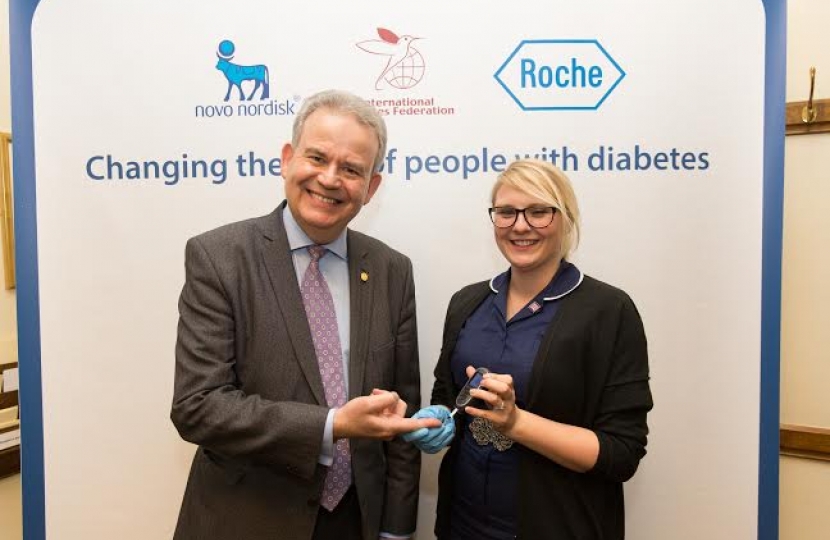
Dr Julian Lewis, MP for New Forest East joined volunteers from the International Diabetes Federation and staff from Novo Nordisk and Roche, leaders in diabetes care, to raise awareness of the increasing prevalence of diabetes in the UK.
Diabetes, in particular type 2 diabetes, is a significant and growing health issue, affecting over 382 million people worldwide. The IDF believes that, unless action is taken, this could rise to 592 million within by 2035. The IDF and its member organisations – which include Diabetes UK – are working to improve the political and public awareness of diabetes as a major disease and the critical interventions that are necessary to counter it and to ensure that people with diabetes receive the high quality treatment they need to avoid unnecessary complications.
Around 3.2 million people have been diagnosed with diabetes in the UK, but it is estimated that a further 850,000 people may be living with the condition without realising it. This means that around 1 in 16 people in the UK are living with the disease – or approximately 6,230 people in the average constituency. If diagnosed early, diabetes can be actively managed to help mitigate the serious consequences of the disease.
Dr Julian Lewis MP had a diabetes test and met with healthcare professionals at a special event in Westminster to find out more about the disease. The event was held with the support of healthcare companies Novo Nordisk and Roche.
Dr Julian Lewis MP said: “With diabetes rates increasing across the country and around the world, I am pleased to support the International Diabetes Federation in raising awareness of the signs and symptoms of diabetes and complications such as cardiovascular disease, blindness, amputation and hypoglycaemia. Getting tested takes only a few minutes and could save you years of illness. If you are concerned about diabetes, talk to your GP or pharmacist about having a blood glucose test, as I did.”
Good diabetes care can help improve the health outcomes and the quality of life for people with the disease. To support this it is essential that people with diabetes have access to the right treatments. However, even for treatments approved by the National Institute for Health and Care Excellence (NICE) for use in the NHS there are considerable variations in how these are being prescribed to patients across England. Beyond the human cost of diabetes, there is a significant financial burden on the NHS and wider society as the result of preventable complications. It was estimated in 2011, that £9 billion per year from the NHS budget is spent on diabetes. Factoring in loss of working days through hypoglycaemia, early death and informal care costs, the cost of the condition to the UK is projected to rise from £23.7 billion to £39.8 billion by 2035 unless action is taken now to address the impact of diabetes.

Dr Julian Lewis with a diabetes healthcare professional
